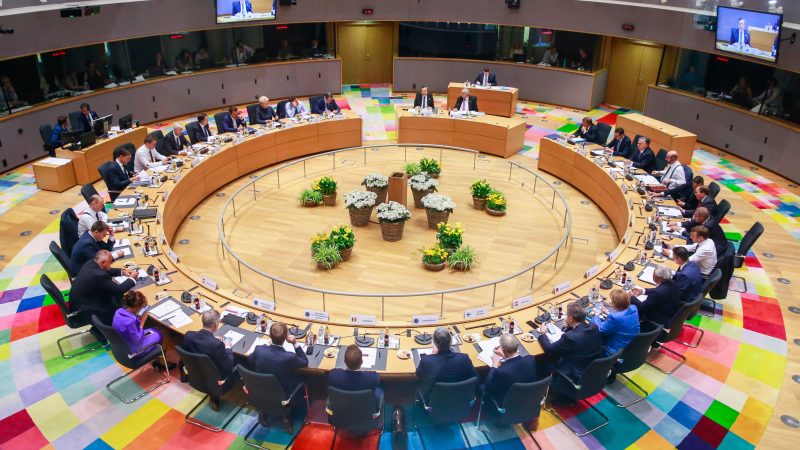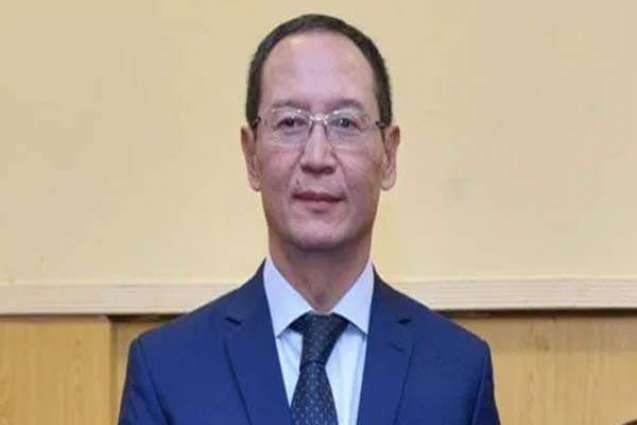
EurActiv (12 December 2019)
European Union leaders meet without Britain on Thursday (12 December), but their departing neighbour’s absence will not make agreeing a budget any easier.
While the EU chiefs watch their phones for news from the UK election, their summit faces a deep divide over how to fund the fight against climate change.
Brussels’ new leadership, under European Commission president Ursula von der Leyen, wants member states to commit to a carbon neutral economy by 2050.
But at least three coal-hungry countries in the east of the bloc are holding out for a more detailed promise of funding for their energy transition.
Opposition to the 2050 target from the Czech Republic, Hungary and Poland will feed into what is expected to be a fierce debate about the long-term EU budget.
And the clash will take Brexit’s place as the dominant theme of the summit, the first to be chaired by incoming EU Council president Charles Michel.
Prime Minister Boris Johnson will not turn his back on a British polling day to make the trip to Brussels, so Michel has been loaned the UK summit vote.
It is not unusual that a leader is absent from a summit. In such cases, he delegates his powers to a colleague from another country. But this is the first time a EU summit coincides with elections held in a member country.
European officials and diplomats fear that the former Belgian premier’s first summit will be more a baptism of fire than a honeymoon.
Diplomats said they didn’t expect any decisions to be taken on the important dossiers on climate and EU long-term budget. A second summit is highly likely in February.
Efforts to convince the eastern members to back von der Leyen’s “European Green Deal” have focused on a 100-billion-euro “Just Transition Mechanism”.
But, a Polish source warned, converting their economies to renewable energy sources would impose “significant costs and challenges”.
“Such a transition should be fair, balanced in social terms and take into account the specific situation in our states,” he said.
Polish and Czech sources predicted that the fight could take the summit into the early hours of Friday morning without an agreement.
“The costs of carbon neutrality will be astronomic,” Prime Minister Andrej Babis said, warning that his country alone would need 26.5 billion euros.
“We want the EU to take this into account in the next budgetary period,” he said.
The next EU budgetary period is the 2021-2027 multi-year financial framework (MFF) — the other unpalatable course on Thursday’s summit menu.
‘Massive brawl’
The 27 are due to discuss the budget over dinner, separately from the climate, but the hold-outs want a budget commitment to transition funding.
Babis also put his finger on another point of contention, asking that nuclear energy be explicitly endorsed as eligible for green finance.
Other atomic energy users — especially nuclear giant France — back this idea.
But Germany, which is phasing out its nuclear power stations, is joined by Luxembourg and Austria in opposing defining this form of energy as a renewable.
European officials acknowledge that, with their summit coinciding with the COP25 global climate conference in Madrid, failure to agree would be embarrassing.
“It’s going to be a massive brawl,” one diplomat warned, as others predicted the sun may be coming up again over Brussels before the talks end.
Ahead of the summit, Michel toured European capitals trying to build consensus on climate and the budget, but he admits it will be difficult.
Finland, which holds the rotating EU presidency, has proposed a seven-year budget based on national contributions amounting to 1.087 trillion euros.
‘The Frugal Five’
This is equivalent to 1.07% of total EU GDP, but less than the 1.114 or 1.3% requested by the commission and the EU parliament respectively.
A so-called “Frugal Five” — Austria, Denmark, Germany, the Netherlands and Sweden — oppose allowing EU spending to swell.
But Finland’s proposed cuts would eat into plans for the green transition, a border force, the digital economy and defence — dear to France.
Von der Leyen criticises Finnish presidency’s EU budget proposal
The new European Commission President, Ursula von der Leyen, did not mince her words at her first press conference on Wednesday (4 December), criticising a recent proposal of the Finnish EU Presidency for the bloc’s 2021-2027 budget and voicing concern “about the severe cuts in the proposal”.
Once their own disputes are resolved — or pushed off down the road — the EU leaders will, on Friday, turn again to Brexit.
If, as many in the EU capitals now hope, Johnson’s Conservatives win a majority then Brussels will expect him to ratify the Brexit withdrawal deal.
A diplomat said the working assumption was that the UK is leaving on 31 January, but leaders would wait to hear the news from London after the vote.
If the news would confirm that the UK will quit the union on 31 January, the leaders will on Friday ask EU negotiator Michel Barnier to be ready for trade talks the next day.
No comments yet.
- ARMENIA DEPUTY JUSTICE MINISTER RECEIVES UK FOREIGN AND COMMONWEALTH OFFICE REPRESENTATIVE The Caucasus and Turkish-Armenian Relations 12.12.2019
-
 EU SUMMIT: EVEN WITHOUT BRITAIN, EU LEADERS UNLIKELY TO TAKE BIG DECISIONS
Europe - EU
12.12.2019
EU SUMMIT: EVEN WITHOUT BRITAIN, EU LEADERS UNLIKELY TO TAKE BIG DECISIONS
Europe - EU
12.12.2019
-
 KYRGYZSTAN CAN PLAY ROLE OF BRIDGE BETWEEN PAKISTAN, CENTRAL ASIAN MARKETS: ENVOY
Central Asia
12.12.2019
KYRGYZSTAN CAN PLAY ROLE OF BRIDGE BETWEEN PAKISTAN, CENTRAL ASIAN MARKETS: ENVOY
Central Asia
12.12.2019
- GERMAN, GEORGIAN DIPLOMATS DISCUSS PROBE INTO GEORGIAN CITIZEN'S DEATH IN BERLIN – TBILISI The Caucasus and Turkish-Armenian Relations 12.12.2019
- GERMAN ARMS COMPANIES ACCUSED OF AIDING WAR CRIMES IN YEMEN Europe - EU 12.12.2019
-
19.04.2024
Türk-Ermeni İlişkileri Üzerine Ömer Engin Lütem Konferansları 2023 -
11.04.2023
Türk-Ermeni İlişkileri Üzerine Ömer Engin Lütem Konferansları 2022 -
27.03.2023
RADİKAL ERMENİ UNSURLARCA GERÇEKLEŞTİRİLEN MEZALİMLER VE VANDALİZM -
17.03.2023
PATRIOTISM PERVERTED -
23.02.2023
MEN ARE LIKE THAT -
03.02.2023
BAKÜ-TİFLİS-CEYHAN BORU HATTININ YAŞANAN TARİHİ -
16.12.2022
INTERNATIONAL SCHOLARS ON THE EVENTS OF 1915 -
07.12.2022
FAKE PHOTOS AND THE ARMENIAN PROPAGANDA -
07.12.2022
ERMENİ PROPAGANDASI VE SAHTE RESİMLER -
30.03.2022
Türk-Ermeni İlişkileri Üzerine Ömer Engin Lütem Konferansları 2021 -
01.01.2022
A Letter From Japan - Strategically Mum: The Silence of the Armenians -
01.01.2022
Japonya'dan Bir Mektup - Stratejik Suskunluk: Ermenilerin Sessizliği -
11.02.2021
Türk-Ermeni Uyuşmazlığı Üzerine Ömer Engin Lütem Konferansları 2020 -
03.06.2020
Anastas Mikoyan: Confessions of an Armenian Bolshevik -
08.04.2020
Sovyet Sonrası Ukrayna’da Devlet, Toplum ve Siyaset - Değişen Dinamikler, Dönüşen Kimlikler -
18.03.2020
Türk-Ermeni Uyuşmazlığı Üzerine Ömer Engin Lütem Konferansları 2019 -
08.03.2019
Türk-Ermeni Uyuşmazlığı Üzerine Ömer Engin Lütem Konferansları 2018 -
12.06.2018
Ermeni Sorunuyla İlgili İngiliz Belgeleri (1912-1923) - British Documents on Armenian Question (1912-1923) -
02.12.2016
Turkish-Russian Academics: A Historical Study on the Caucasus -
01.07.2016
Gürcistan'daki Müslüman Topluluklar: Azınlık Hakları, Kimlik, Siyaset -
10.03.2016
Armenian Diaspora: Diaspora, State and the Imagination of the Republic of Armenia -
24.01.2016
Ermeni Sorunu Temel Bilgi ve Belgeler (2. Baskı)
-
AVİM Conference Hall 24.01.2023
CONFERENCE TITLED “HUNGARY’S PERSPECTIVES ON THE TURKIC WORLD"









